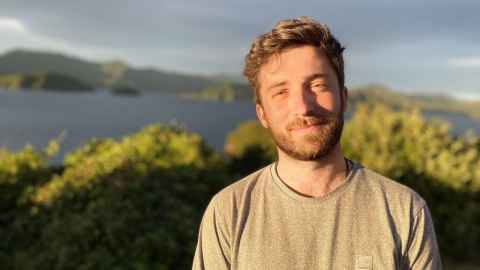Noah Bunkley
Doctoral candidate in the Faculty of Medical and Health Sciences

Tell us a bit about yourself
I was born in the USA and moved to New Zealand when I was three. I grew up in Whanganui and moved to Auckland at 18 to complete an MBChB with the University of Auckland.
I enjoy playing guitar, board games and outdoor sports such as mountain biking and rock climbing.
What's next on your travel bucket list?
I would love to go to Canada and go to Banff to go snowboarding, mountain biking and rock climbing in one of the world’s best mountain sports locations.
What are you most passionate about?
I am passionate about addressing the determinants of global health inequities. I want to do my part to improve the world by addressing the upstream determinants of health so that people can have healthy places to live, work and play.
Climate change is one of the most pressing issues already risking the health and wellbeing of billions of people worldwide. It will particularly affect those communities already marginalised, where populations are living in vulnerable settings, and threaten to worsen global inequities.
I want to contribute to the work of combating the impacts of climate change and other global drivers of disease through my research.
What is the title of your thesis?
Assessing the impact of cool roofs on health and wellbeing of household residents.
How did you end up in your field of study?
I initially studied medicine because I wanted a career where I could help people and make a difference. I had dreamed of becoming an emergency medicine doctor and working for an organisation such as Doctors Without Borders. The allure of an adventure and doing good in the world drew me to medicine.
However, after completing my final year overseas elective placement at a rural hospital in Tanzania and gaining a deeper understanding of the upstream determinants of health, I decided to move into public health with a focus on global health equity. I realised that to make a bigger difference, I needed to address the structural causes of disease, strengthen health systems and the determinants of health, and fight for global health justice.
After completing my MBChB, I moved to Tauranga to work as a junior doctor for three years, further strengthening my desire to work in public health. I saw patients with preventable conditions that were repeatedly presenting to the hospital, and I understood that to prevent illness and disease, I had to address the structural issues that were making people sick in the first place.
Therefore, I joined the New Zealand College of Public Health Medicine to complete my specialist training in Public Health. As part of the specialist training, I returned to Auckland to complete a Master of Public Health at the University of Auckland where I fell in love with global health.
Shortly after completing my Master’s, I helped write a grant for a study assessing a housing intervention addressing heat in low-resource settings as a climate change and environmental determinant of health. We were awarded the grant from the Wellcome Trust UK, and I decided to undertake a PhD to continue working on the project.
I am now completing my PhD and am in the final stages of my public health specialist training.
What do you hope will change in your field as a result of your research?
Understanding the impact of cool roofs on health and wellbeing will provide valuable information to inform policy responses to climate change-induced extreme heat exposure. With the increasing severity and frequency of heat waves in the coming years, solutions are urgently needed to protect vulnerable communities.
My research will help identify ways to build climate-resilient environments through adaptive housing solutions with immediate and long-term benefits for the health and wellbeing of climate-vulnerable communities.
What do you plan to do once you have finished your doctorate?
I will finish my specialist training in Public Health medicine, then hopefully work in public health policy or global health, either in New Zealand or for a global health organisation such as the WHO.
If you could invite four people to dinner, who would they be, and why?
I would invite people who would engage in interesting conversations that could help understand and solve some of the world’s most pressing problems.
Rutger Bregman, a historian and author of Utopia for Realists, for conversations brainstorming new ideas from a historical and social wellbeing perspective.
Peter Singer, an ethical and political philosopher, for adding philosophical and moral grounding to the conversations.
Tedros Adhanom Ghebreyesus, Director General of the World Health Organization (WHO), for providing wisdom on the practicalities of navigating the global political landscape with a strong focus on global health equity.
Sam Altman, CEO of OpenAI, to bring insights on the future of AI and for the rest of the dinner party to challenge him on ensuring safe and just AI development.